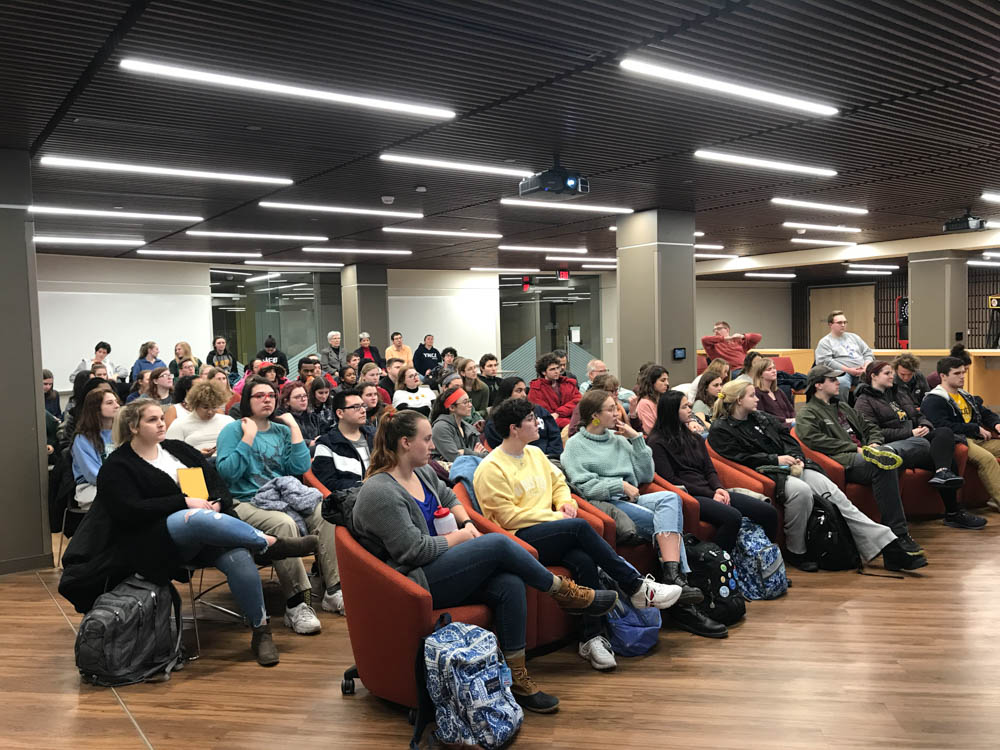
Ellie Kahn
Features Editor
Observed each year on Jan. 27, International Holocaust Memorial Day serves as both an acknowledgement of the lives lost in the Holocaust and as a stark reminder to recognize and prevent similar acts of genocide today. In observance of the day, Religious and Spiritual Life (RSL) collaborated with Hillel, a Jewish faith-based student organization, to offer a week-long series of events. The events were open to students, faculty and staff at the College, as well as to the broader Wooster community.
This year’s commemoration was particularly distinct due to the fact that it marked the 75th anniversary of the “liberation” of Auschwitz in occupied Poland; operating from 1940 to 1945, the concentration camp complex was responsible for the deaths of over one million Jews and other marginalized groups, including immigrants, those with disabilities, gay men and political prisoners.
The week-long series was primarily planned during the fall semester after being initially conceptualized by Isaac Weiss ’20, who serves as treasurer for Hillel. President of Hillel Hannah Sullivan ’20 described the planning process as difficult in that the “sensitive and personal nature of the events” placed an “enormous emotional strain on [members of] the Hillel board.” This sentiment was echoed by general board member Emily Farmer ’20, who added that while the planning process was “emotionally burdensome,” it was worthwhile to “see people engaginging with and confronting history and modern anti-Semitism.”
When asked about the goals for the week, Sullivan reflected that overall, Hillel aimed to engage the campus community in recognizing the Holocaust and commemorating the liberation of Auschwitz. She noted that “we put ‘liberation’ in quotes as a way to recognize that though Jews and other interned peoples were free to leave Auschwitz, there was still plenty of hardship and hate that followed. We also wanted to recognize that anti-Semitism exists today as well as modern-day genocide. Everyone says ‘Never Again’ while referring to the Holocaust, but genocide has happened since, and continues to happen today.”
The week began on Monday, Jan. 27 with a Skype presentation from Conrad Weiner. A Holocaust survivor, Weiner spoke about his experience confined in Budi, a forced labor camp in the state of Transnistria, Moldova. The event was well-attended, with over 100 students, administrators and community members present to hear from Weiner.
Farmer expressed that she was “especially glad that students and the community were able to listen to Mr. Weiner speak; first hand accounts of atrocities always leave a lasting impact, and in the near future it will become much less accessible to hear first-hand accounts of the Holocaust without the aid of technology.” Sullivan agreed with Farmer, emphasizing that “soon, there will not be people able to give first-hand accounts of what happened in recent history. Therefore, it is our role as young adults to hear their stories, and pass them on.”
The conversation with Weiner was followed on Tuesday, Jan. 28 with the Hillel board presented their dialogue “Anti-Semitism in America: Roots to Now and Its Impact on Wooster Jews” for the second time. The dialogue was first presented on Martin Luther King Jr. Day last month as part of the College’s Justice Dialogue series, and both presentations included time for discussion. According to Farmer, “the faculty and students, especially the non-Jewish members of the audience who showed up to discuss the realities of anti- Semitism on this campus made me feel as though we as Jews do have a community who will support us in Wooster, and hearing their stories and discussion on their experiences witnessing [and] contributing to anti-Semitism was powerful.”
On Wednesday, Jan. 29, the 2001 film “Conspiracy” was screened in The Alley. Directed by Frank Pierson, the film covers the 1942 Wannsee Conference which largely contributed to placing Adolf Hitler’s “final solution” into effect. The discussions continued on Thursday, Jan. 30 when Hillel presented a panel in conjunction with Noor, the Muslim student organization on campus. The topic of the discussion was genocide in the last century, which included both the Holocaust and more contemporary cases such as Uighur Muslims in China.
The week-long commemoration came to a close on Friday, Jan. 31, with a brief Shabbat service and dinner led by the Hillel board in Lowry. Overall, the week served as a reminder that “anti-Semitism is still here … each of us on the board, and every Jew on this campus, has had a run-in with anti-Semitism. The liberation of Auschwitz did not end anti-Semitism. And it certainly did not end genocide. Genocide still occurs in the world; millions have been killed since the Holocaust. As Jews, and as citizens of the world, we must act so that ‘Never Again’ really means never again,” according to Saralee Renick ’22, religious coordinator for Hillel.
In terms of being an ally for those in the Jewish community, Re- nick encourages “be[ing] there for your friends and peers. Marginalized communities face discrimination and hate every day. Do what you can to stand up for people and to stand against hatred and vio- lence.”
In the words of Farmer, for those both in the Jewish community and those who are not, Hillel would like to extend an invitation to join them “at any events when you need a group to lean on or engage with. Whether it’s at a Shabbat dinner or in a week of commemoration, Hillel’s doors are always open to those who are looking for a place of community and rest.”
